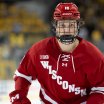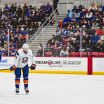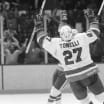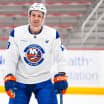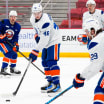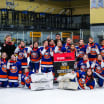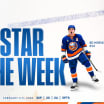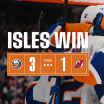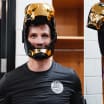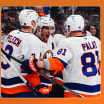Maven's Memories: Morrow Joins Isles at Start of Cup Run
Fresh off an Olympic gold medal, Ken Morrow joined the Isles in March of 1980
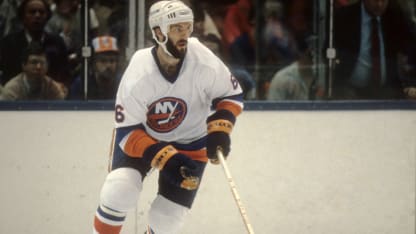
© B Bennett/Getty Images
But you may not have heard this one because there's a hidden tale behind the Ken Morrow story and it boils down to a simple -- yet indisputable -- fact of hockey life.
Were it not for this gangly defenseman from Flint, Michigan, there never would have been a unique 1980 Miracle On Ice closely followed by the encore of all encores, the Islanders winning their first Stanley Cup.
Looking backward, it was a fateful pre-Olympic decision that Ken made after Team USA coach Herb Brooks selected his dozen core players who would lead the eventual Gold Medalists.
"Players like Morrow all had concerns about jeopardizing their pro careers by joining the Olympic team," observed hockey historian Ken Hubbard. "They were fearful that the pro clubs wouldn't wait."
"Or that a career-threatening injury might occur," Hubbard added. "Plus, Morrow also needed money in the interim. It was a decision made by Ken that enabled him, and eventually the other players, to join the team. Without Ken, no Gold!"
Morrow's rep, attorney-agent Art Kaminsky, was in the middle of negotiations to clear the impasse. Writing in his book, One Goal, Kaminsky said it was a matter of getting Morrow -- or bust.
"The players had to be convinced," wrote Kaminsky, "And the key to that was Ken, but he had issues. Plenty."
Morrow was on the spot. His father had died when he was a freshman at Bowling Green. Then, the Islanders had drafted him higher than any collegian in their history and he was being tugged in two directions. Pros vs. Olympics.
"Ken spent four years at Bowling Green," Kaminsky added, "And turned it into a powerhouse. Now he was about to be married and he could have used a professional salary from the Islanders."
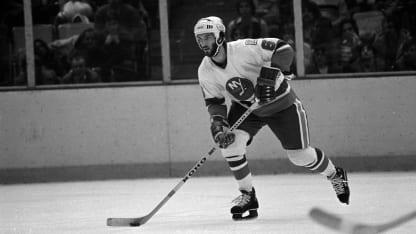
© B Bennett/Getty Images
That's when Isles General Manager Bill Torrey entered from Stage Right. Bow Tie Bill helped -- along with Kaminsky -- to cut a deal that persuaded Morrow to go Olympian.
Kaminsky: "I went to Torrey, had him pre-negotiate a contract for Ken and put it in a drawer. All Ken had to do was sign it whenever he wanted. Plus, we got insurance to cover the signing bonus and two years NHL salary."
Once the other undecided potential Olympians heard about that, they jumped on Ken's bandwagon. And, thanks to Morrow, Herb Brooks got his eventual Gold Medal nucleus. They included the following, among others:
Goalie Jim Craig, who might have signed with Atlanta, followed Morrow. So did defenseman Jack O'Callahan, wooed by the Blackhawks; Bill Baker, who had his eyes on a Canadiens contract and Steve Christoff, a North Stars prospect.
Once the Olympians jelled as a team, Morrow's personality unfolded and coach Brooks -- as Al Arbour later would -- realized he had a winner.
"You didn't have to motivate Kenny Morrow," said Brooks.
Kaminsky, who was as close to Ken as anyone, recalled that before big games Ken would wonder if he really had the goods. "Once he put on the gear," Kaminsky added, "he'd be transformed. Now the confidence was unshakeable; his appetite for ice time boundless."
It was the kind of stuff that eventually won Ken a place in the U.S. Hockey Hall of Fame.
On their implausible drive to the Gold Medal at Lake Placid, the Olympians regarded Morrow as their leader.
"He looks like a Greek god," said goalie Jim Craig, "with the beard, the calm expression and the aura of control."
Teammate John Harrington said that Morrow was good in any direction.
"You couldn't beat him," said Harrington. "And if he got the puck, nobody was taking it away from him."
And so, Ken Morrow, Jim Craig, Mike Eruzione and Company went to Lake Placid, gave the Russians a "Here's How!" and wound up with one of the most arresting triumphs in sports history; the Miracle On Ice.
But now Ken needed an escape hatch. After a presidential reception at the White House, he went to his wife's house for three days as the adrenaline settled. Next Bill Torrey had him sign the contract and he became an Islander.
Bow Tie Bill had been covering Morrow throughout the Olympics. So had Long Island journalist Alan Hahn who later would author Birth of a Dynasty.
Hahn: "Torrey was impressed with Ken's quiet dominance in the defensive zone. He made simple plays and was rarely out of position -- things hardly noticeable to the casual fan but glaring to a trained eye such as Torrey."
The Isles boss was particularly impressed with the manner in which Ken defused the Soviet Olympians top line in the famed upset that catapulted Team USA to the Gold.
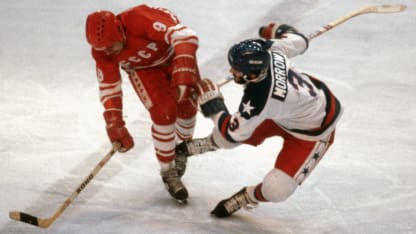
© Focus On Sport/Getty Images
"If he can handle this," said Torrey, "he can handle anything."
The high command agreed that there'll be no minor league "experience" for Morrow. He would start his first NHL game on March 1,1980 against the Detroit Red Wings.
"I was incredibly fortunate with the timing," Ken told me, "and the opportunity they gave me. I joined a very good team that was on the verge of greatness. For that I says 'Thanks!' to Herb, Bill and Al."
"Also coming right to Long Island after the Olympics was beyond anything that I could have hope for; I was skipping the minors."
Prior to his debut Ken schlepped to the Coliseum not knowing what to expect. The first thing he learned was that he didn't even have a locker stall. A few of his new mates chirped, "You'll be taking somebody's locker soon enough."
When the chuckles had subsided, Denis Potvin entered the room. The captain had missed 41 straight games with a thumb injury and now was ready for his comeback.
"I'm putting Denis with Morrow," Arbour told the media before the opening face-off. (In time they would evolve into one of the best defensive pairings in NHL annals.)
Detroit won the game 4-3 and the raw rookie's reviews were more positive than negative. What mattered most was that the coach liked him.
Arbour: "The kid is cool and calm. He reminds me of the actor Cary Grant riding in the saddle. Or was it Gary Cooper? (It was). Whatever!"
Cooler than an air conditioner, Morrow enjoyed his new experience in The Show. His play matured as he got the feel of big-league hockey and his feats began to accumulate by the weeks.
Morrow: "I was incredibly fortunate to play for a legendary coach like Al, and have a couple of things work in my favor. For one thing, I believe that he saw a bit of himself in me. We were both defensive style defensemen.
"I valued defending and killing penalties and taking care of my own end, and Radar appreciated that. Plus, I was low-maintenance. I just wanted to do my job and be on the ice; and Al treated me as such."
For Ken's second NHL game, the Isles invaded the hostile Spectrum in Philadelphia. Amazingly, Flyers fans rose as one -- hailing Ken -- when Morrow's name and Olympic accomplishments played on the message board.
Philly fans were less enthused later when Morrow helped orchestrate Bob Nystrom's winning goal early in the third period. As the 1980 NHL trade deadline approached, Ken's plays got Torrey thinking about a blockbuster deal.
"The quick success of Kenny meant that Bill could unload a defenseman," said goalie Glenn (Chico) Resch. "That's how we wound up getting Butch Goring, He was 'The missing link' on our way to the Cup. Thank you, Kenny."
Goring, a speedy center, was obtained 10 days after Morrow's debut. Torrey gave up Dave Lewis, a good defensive defenseman and good team guy, and Billy Harris, a top winger and the Isles first pick in the 1972 Amateur Draft. They were well-liked and good players, but Butch turned out to be a catalyst for the four cups. Now the Islanders were set and fast-improving Morrow rarely needed to be pushed.
"I wasn't a guy who responded to prodding and mind games," Ken revealed. "In a sense Al was like Herbie (Brooks) in that I occasionally did need a kick in the pants. And every now and then Al would give it to me. (Laughs.)
Andrew Podnieks, an objective historian who wrote a who's who of hockey called Players, appraised Morrow with these words:
"He was not a flashy defenseman but he was entirely reliable and he chipped in with timely offense."
Considering some of the games Ken helped win, the term "timely" was an understatement. Exhibit A was Morrow's 1980 overtime goal against the Los Angeles Kings. It turned out to be the turning point of the best-of-five series.
"That goal by Kenny took a million pounds of pressure off everybody," signaled Mike Bossy. It also paved the way to the Isles first Stanley Cup
Big goals were only one facet of the Morrow offensive repertoire. When huge assists were the order of the day, Ken came through. A classic case took place on April 13, 1982.
Once again the Isles were threatened with an upset -- they trailed Pittsburgh 3-1 with less than six minutes remaining in the third period -- when Morrow helped set up John Tonelli's huge tying goal with two minutes and change left. Tonelli then won it in overtime en route to the club's third straight Cup.
"In my 10 years, I was lucky to play in so many memorable games," Morrow remembered. "I can't forget when we went for our fourth straight Cup. We beat Edmonton in three straight and now it was Game Four on the Island.
"We nursed a one-goal lead in the third period and, finally, the Oilers pulled their goalie. I was so happy to put the puck in the open net. We did not want to go back to Edmonton."
A minutes later, the Islanders claimed their fourth straight Cup.
In his book, "Raising Stanley" author Ross Bernstein captured Morrow's thoughts immediately after the 1980 victory.
"When you win the Cup you are flooded with a variety of emotions. The first thing I thought were all the people who helped me along the way because I certainly didn't get there by myself."
"I was thinking of coaches, parents, friends and teammates - the ones who made it possible. Beyond that, it was just a huge relief because in the playoffs, it's survival of the fittest. It's the hardest championship in any sport. It definitely makes you appreciate all the hard work it took to win it."
Another of Ken's "Most Memorable" games actually extended over two days -- April 18-19, 1987 at Capital Centre, home of the Washington Capitals. It was Game Seven of the Patrick Division Semi-Finals. Alias, The Easter Epic.
Morrow: "What made that one so special was that it went into a fourth sudden-death overtime before Patty (LaFontaine) won it for us. It was surreal. I'd never been through anything like that before or since."
But, by Ken's own admission, no goal he ever tallied could match the April 10, 1984 overtime torpedo that beat goalie Glen Hanlon and routed the Rangers.
I interviewed Ken on that one for Chris McDonell's book The Game I'll Never Forget. With the score tied, 2-2, in the first OT, Morrow's shot at 8:58 beat goalie Glen Hanlon and eliminated the Blueshirts from the post-season.
Morrow: "Some people have said that this was one of the greatest games of all time and who am I to argue? What I can say for certain is that it ranks at the top of my list."
And when it comes to Islanders defensemen not in the (NHL) Hockey Hall of Fame -- but most definitely should be -- Ken Morrow is at the top of my list!


